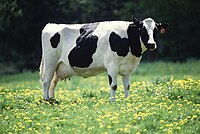
Photo from wikipedia
Abstract Background Mastitis in dairy cattle is a highly prevalent infectious disease, caused by various pathogens, mainly Staphylococcu aureus and Escherichia Coli, considerable economic loss worldwide. Objectives The aim of… Click to show full abstract
Abstract Background Mastitis in dairy cattle is a highly prevalent infectious disease, caused by various pathogens, mainly Staphylococcu aureus and Escherichia Coli, considerable economic loss worldwide. Objectives The aim of this study was to evaluate the in vitro activity of Herbal plants used against S. aureus and E. coli bacteria which are the causative agents of mastitis. Methods Therefore, in this study we investigate the antimicrobial effect of plant to evaluate the in vitro antibacterial activity of squaw mint (Mentha pulegium L., Lamiaceae family), catnip (Nepeta cataria L., Lamiaceae), lemon balm (Melissa officinalis L., Lamiaceae), for mastitis treatment. Solutions prepared in fixed oils, against S. aureus and E. coli bacteria which are the main agents of mastitis. Isolation and antibiotic susceptibility analyses of milk samples taken from 100 subclinical mastitis dairy cows were performed. The antibacterial properties of the solutions were analysed by a disk diffusion method. Results In the bacterial isolation, S. aureus was determined 97.7% and E. coli 53.5% positive of cows with mastitis. Antibacterial susceptibility test of the Lemon balm extract and essential oil showed maximum zone of inhibition against S. aureus 30 µl (23 mm), followed by 20 µl (19 mm), E. coli (19 mm) and 10 µl (5–7 mm), of the same extract against the Gram‐positive bacteria. The ethanol extracts show the similar activity against the Gram‐negative bacteria at 30, 20, and 10 µl (18–20 mm). Followed by S. aureus, when the zone areas for the susceptible solutions (Lemon balm, and essential oil) and the control group were compared, determined that there was little difference between for S. aureus and E. coli. Conclusions This study hence indicated that in vitro cultured plantlets of lemon balm and peppermint oil can be used as the alternative method for production of mastitis and cheap source its precursor with antimicrobial activities.
Journal Title: Veterinary Medicine and Science
Year Published: 2022
Link to full text (if available)
Share on Social Media: Sign Up to like & get
recommendations!